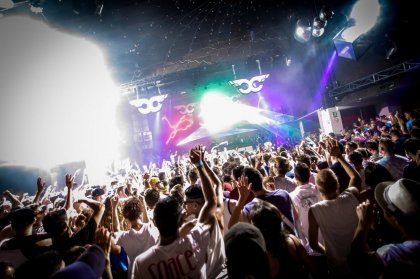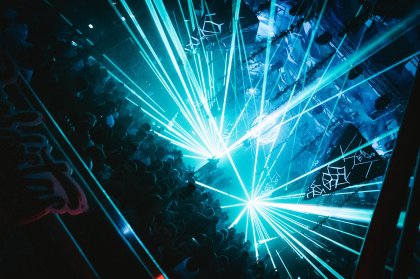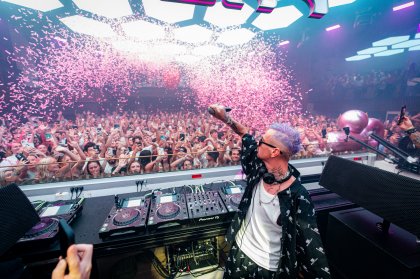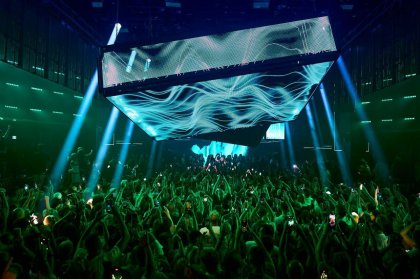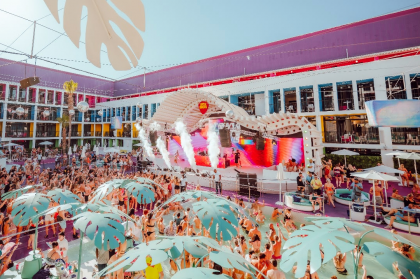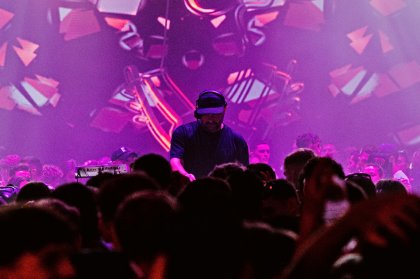Spotlight: Tell us about new compilation Structures, why didn’t you just carry on the Transitions series?
Well I wanted to focus on building Bedrock Records back up and raising the profile a bit more and Transitions was released with another label, so Structures and Bedrock 10 and 11 are obviously releases from a label I’m involved in.
In terms of making a compilation these days, how different is it compared to say the Renaissance Mix Collection in 1994?
Well the albums that I’m doing now like Structures, I’m actively going out and signing tracks exclusively to Bedrock Records to then mix on this album, whereas the Renaissance album was just choosing your favourite tracks from around the world and then trying to piece them together. This time I’m buying all the pieces of the jigsaw puzzle and then hoping it makes sense and fits together. So it’s a different way of doing it, the other albums you work the tracks out you like and then try to licence them, this way I’m commissioning remixes, commissioning original tracks exclusively for this album.

So you invest a lot more in the process too then?
Yeah, cos I’m guiding the artist, saying “I like this track, but can you look at this section, cos it’s not quite right”, so I’m having a hands-on approach with putting the album together but also when the tracks are coming through themselves.
How have you tried to make the album appeal, given the proliferation of compilations?
Well, just by the fact that 2/3 of them haven’t been released before, so that’s important. It’s so hard to put something out that hasn’t been heard by someone, although there is so much music out there that even including tracks that have already been released isn’t a bad thing because there is enough good music out there that has been missed. But I wanted to control the whole project and the tracks so that they worked well for this album.
Tell us about the documentary that goes with this album?
Basically, a friend of mine in South America knows this film director and said he’d be interested in doing a documentary next time you’re down here. We spoke over email and I was organising a tour in Brazil and Argentina, he arranged to set up this documentary and I was blown away by the end result. It was like he set up locations that had some relevance to the answers he knew I was going to give, he really thought about what he wanted to portray and basically give a visual aspect to an interview, rather than me sitting backstage at a festival in a green room. There was a theme that runs through it that makes sense and for me it’s nice to have someone who’s really thought about what they’re doing from start to finish and it really makes sense.
South America is a real stronghold for you isn’t it?
I’ve been going there a long time for one and two, they’re very passionate, so if they like something, they really like it. I’ve been in Buenos Aires with 10,000 people and just me and one other DJ playing. They turn out in thousands and it’s great to have that type of audience that really get behind you and have the same energy at the start of the night, as they do at the end.
How do you go about structuring your set given the different the type of crowds you might encounter?
Well I take each gig as it comes; I think that’s the beauty of what I do. I mean last week I was playing at Pacha in Munich to 700 people and on Saturday I was in Belarus with 10,000. At Pacha the music was a lot more housey, groovy, tripped out stuff, whereas the Saturday was tougher, banging and some big moments in there. So I don’t think it’s ever a case of this is my set for June and I just play it regardless. I have to read the crowd and playing the right music that will make it work, which comes from experience, not just having the top 10 from Beatport and playing them one after another.
In 2010 is there such a thing as a Bedrock sound?
Bedrock’s always been about pushing things forward and playing the best music that’s out there at the time. So in 2010, we’ve definitely got a techno influence on the label.
How do you find the artists you sign?
There’s not one particular way of signing a record, you could be in a certain club or you could sent a link or a friend of mine just sent me a track, so it’s a combination of being in the right place or the right time. I get sent 100s of tracks a week that I have to go through, but I can normally tell within the first minute whether I like it or I’m going to listen to more of it.
You have one of the longest running radio shows of any DJ, that must be an important part of the John Digweed/Bedrock package?
It’s immensely important, it goes around 30 countries and the listenership is 8 million a week, so to be able to reach that many people, with what you do, is amazing. So I do appreciate being there and the radio shows also gives me a platform to promote new music and also try different things.
You have a very comprehensive release history, why have you never done an artist album?
It’s never been that thing for me where I thought I have to do one. I’ll work with Nick Muir and we’ll get a track finished and think “let’s release it”. It’s just never been something that is a major priority and in this day and age, people pick and choose anyway, you can spend a year working on an artist album and they might only like one track of it and that’s all they buy. Also, it’s a whole body of work and I think I’d find it hard to give the time to it too.
We’ve got a new release next month called Satellite and then we’ve got another one ready to go after that. We’ve just remixed Tom Middleton track, so we’ve probably been the most productive studio wise for some time. But I’ve never had the urge to say “right, let’s do an artist album”, I don’t think it’s gonna make or break my career.

You’re at Space Ibiza again, you obviously know the club really well?
Yeah, well Carl’s night is one of the best nights on the island. The crowd he attracts are music people and that’s really important, because you don’t want to be at a gig and they don’t know what you’re doing. Space has great sound and lighting and you know, people have tried to say other destinations are the new Ibiza, but there’s only one Ibiza, I mean it caters for every genre and taste. You have Guetta, Cream, Cocoon, Carl and even Tiesto doing his thing, so you can go out and be blown away every night of the week.
Has the opportunity never come up for you to do your own night or something weekly in Ibiza?
Ha! I don’t think my brain cells could cope with being in Ibiza every week.
Fair enough!
What about New York, what’s happening there, as I know that’s always been a prominent place in your touring schedule?
To be honest, New York has died off quite a bit the last year or two. After Twilo shut, some other clubs closed down and it’s a real shame because its gone from being the city that never sleeps to the city that’s asleep at midnight. I’ve played Pacha there and I’m back in September for Electric Zoo, which is a huge festival over there.
Talking about the scene dying off, there is a similar sort of feeling with what’s happened in London. What do you think about that?
I think the situation is that like during the last recession, when club land thrived because people wanted to go out and forget about it, it’s like now people will save their money for the big nights rather than go out 2 nights a week,. They’ll do the guaranteed good nights, so it means the good stuff is still busy but it’s tough. People aren’t spending as much when they get there too, but the likes Glastonbury and Creamfields will always sell out. I also think at the moment things like the World Cup can make a difference, people not going to Ibiza for a week but just going for a few days instead. So it’s definitely got tougher but there are still good parties.
What’s your live set up?
I use CDJ2000s and yeah they’re really well thought out, the record box..... It’s very clever, the way you can organise your music.
Do you just rock up with your USB stick?
I still take CDs as a back-up but it’s definitely heading in the direction that it seems like you’re carrying less but you’re actually taking more.
